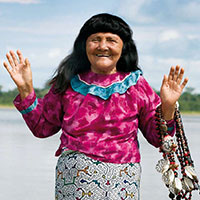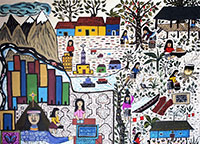Category Archives: Shipibo Culture
| Shipibo Culture | Videos |
The Culture & Artistry of the Shipibo-Konibo

Teacher and master healer Juan Agustin speaks about the rich heritage and artistry of the Shipibo-Konibo people, a thousands of years old native culture that lives in the Peruvian Amazon. Maestro Juan Agustin Fernandez, is a Shipibo leader of the Cantagallo pueblo in Lima, Peru and Secretary of the Shipibo cultural organization ACUSHIKOLM, la Asociación…
| Shipibo Culture |
Origin of the Name “Shipibo”

The Shipibo peoples’ name comes from the Saddleback Tamarin monkey which is called shipi in their language and known as the “pichico” in Spanish. They were thought to resemble this adorable little fellow after drinking a traditional beverage called masato from small ceramic bowls, which leaves a white mark around their lips just like the…
| Shipibo Culture | Videos |
Para los Niños

As part of our community empowerment initiative, Song of the Amazon is excited to be teamed up with Psicopompo Perro Negro Cultural Association. Psicopompo Perro Negro works to promote diversity and preserve the cultural voice by creating animated videos with children and young people. They use animation to promote education, healthy practices, and as…
| Shipibo Culture | Visionary Art |
Featured Artist: Elena Valera – Bahuan Jisbë
| Icaros | Shipibo Culture | Videos |
Music of the Shipibo Konibo

Nocontari Mashá Iká This beautiful icaro features images of the Shipibo Konibo people in the village of Santa Clara, some in traditional dress. The male poncho type garment is called a tari, made with handmade cloth dyed with plant pigments and often decorated with patterns called kené. Female traditional clothing consists of the chitonti, an…
